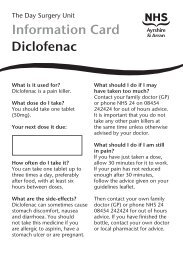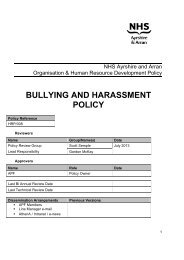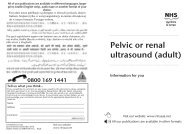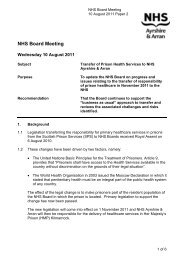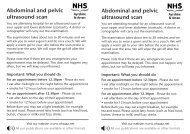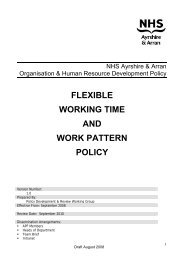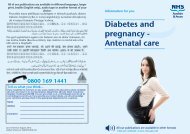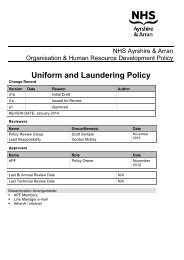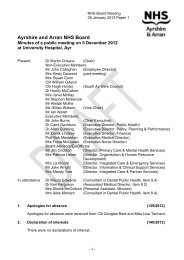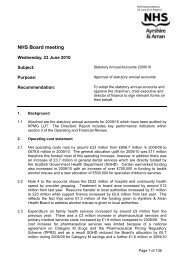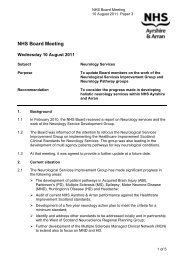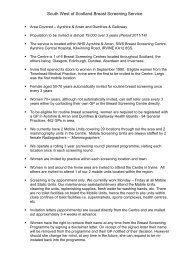The Management of Significant Adverse Events in NHS
The Management of Significant Adverse Events in NHS
The Management of Significant Adverse Events in NHS
You also want an ePaper? Increase the reach of your titles
YUMPU automatically turns print PDFs into web optimized ePapers that Google loves.
<strong>The</strong> <strong>Management</strong> <strong>of</strong> <strong>Significant</strong> <strong>Adverse</strong> <strong>Events</strong> <strong>in</strong> <strong>NHS</strong> Ayrshire & Arran – June 2012CONCLUSIONS AND RECOMMENDATIONS FOR<strong>NHS</strong> AYRSHIRE & ARRAN<strong>NHS</strong> Ayrshire & Arran has sought to build a more open and transparent approach to themanagement <strong>of</strong> significant adverse events and has made progress <strong>in</strong> this regard. It hassought to actively <strong>in</strong>volve families <strong>in</strong> this exercise.However, and notwithstand<strong>in</strong>g the considerable efforts made to build an improvedsystem, the Review Group identified material weaknesses <strong>in</strong> the system <strong>of</strong> significantadverse events review management. Many <strong>of</strong> these related to document control andsystems <strong>of</strong> governance. However, the Review Group felt that the more substantialshortfalls related to staff <strong>in</strong>volvement, action plann<strong>in</strong>g and the dissem<strong>in</strong>ation <strong>of</strong> widerlearn<strong>in</strong>g. In summary, the <strong>Adverse</strong> Event Policy and Support<strong>in</strong>g Procedures was notreliably or consistently applied <strong>in</strong> <strong>NHS</strong> Ayrshire & Arran.<strong>The</strong> follow<strong>in</strong>g recommendations are made.Recommendation 1:<strong>NHS</strong> Ayrshire & Arran should work, build<strong>in</strong>g on AthenA, to establish a s<strong>in</strong>gle robustdatabase <strong>of</strong> significant adverse events that allows easier track<strong>in</strong>g <strong>of</strong> progress and averifiable audit trail.Recommendation 2:<strong>NHS</strong> Ayrshire & Arran should ensure that whatever system is used, there is clarity <strong>of</strong>record<strong>in</strong>g <strong>of</strong> complete and consistent <strong>in</strong>formation with appropriate connectivity andaudit trails between systems.Recommendation 3:<strong>NHS</strong> Ayrshire & Arran should ensure that there is an appropriate level <strong>of</strong> scrut<strong>in</strong>y <strong>of</strong> the<strong>in</strong>formation <strong>in</strong> the Datix system to give assurance to the Board as to the robustness <strong>of</strong>the identification, management and learn<strong>in</strong>g from significant adverse events.Recommendation 4:<strong>NHS</strong> Ayrshire & Arran should establish a robust and transparent process for theescalation <strong>of</strong> adverse events, and ensure decisions there<strong>in</strong> are well documented.Recommendation 5:<strong>NHS</strong> Ayrshire & Arran should undertake a retrospective analysis <strong>of</strong> the deaths that didnot proceed to significant adverse event review, to provide assurance that appropriate<strong>in</strong>vestigation and learn<strong>in</strong>g was undertaken.Recommendation 6:<strong>NHS</strong> Ayrshire & Arran should move to a consistent model for significant adverse eventreviews, ensur<strong>in</strong>g the effective <strong>in</strong>volvement <strong>of</strong> a multidiscipl<strong>in</strong>ary team.6



